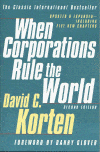Our History
The People-Centered Development Forum (PCDForum) is the legal name of our organization. We trace our origin to March 1987, when more than a hundred leaders of non-governmental organizations and other development professionals from forty-two countries met in London for a Symposium on “Development Alternatives: The Challenge for NGOs.” Participants concluded that conventional development has failed and that officially favored prescriptions disempower and impoverish the majority of people and destroy the environment.
 Makati Financial District of Manila, Philippines
Makati Financial District of Manila, PhilippinesIt became evident to many of us that the leadership for change would not come from the World Bank, the IMF or official agencies that remained committed to failed prescriptions. Change would depend on voluntary citizen leaders acting outside the establishment.
The founders of the PCDForum were among a then small and lonely band that stood up to challenge the prevailing growth-centered economic development mode. 
The human burden on the earth’s ecosystem already exceeds sustainable limits. Growth-centered economic policies increase this burden, accelerate the breakdown of the earth’s regenerative systems, and intensify the competition between rich and poor for the earth’s remaining real wealth. The result is a three-fold human crisis of increasing poverty, environmental destruction, and social disintegration. Growth-centered development must be replaced with a development that strengthens the self-reliant capacity of people and communities to better use their own resources to meet their own needs. Because official aid agencies are captive to internal structures and imperatives that serve the flawed logic of growth-centered development, leadership for change must come from citizen volunteers motivated by life-centered values rather than conventional economic and political rewards.
From 1990 through 1997 the Forum maintained an Information Service that distributed path-breaking think-pieces to cooperating publications around the world. By the end of 1991, the Forum had signed on 86 leading intellectual activists from 31 countries to as contributing editors who made regular contributions. By the end of 1997, some 200 people had served as PCDForum Contributing Editors at one time or another. They were, however, no longer a lonely and isolated band and the PCDForum Information Service no longer fulfilled a distinctive role.
New York City pre-9/11
Recognizing that the issue went well beyond the dysfunctions of myopic official aid agencies that the United States is the primary driver of the dysfunction, we moved the Forum’s office from Manila to New York City in 1992 and gradually began to focus our attention on the institutions of corporate globalization.
In 1994 we joined a parallel conversation with a global group of activists who formed the International Forum on Globalization (IFG). For nearly 10 years, the IFG served as the leading voice of a growing global citizen resistance against corporate globalization.


It became increasingly evident that although resistance against a destructive economic system is essential, it only slows the damage. Change depends on active citizen engagement in building alternatives. To this end, the Forum took a lead role in establishing YES! Magazine dedicated to advancing awareness of positive alternatives and assisting individuals in finding their place of contribution toward their realization.

Life After Capitalism, which applies principles derived from the study of living systems to the creation of economies that serve life rather than money. This led to our contribution in 1991 to founding the Business
Alliance for Local Living Economies (BALLE) to support local organizers in rebuilding local economies grounded
in living system principles.
 Police rioted, but 50,000 protesters committed to nonviolent resistance prevailed at historic Seattle WTO protest
Police rioted, but 50,000 protesters committed to nonviolent resistance prevailed at historic Seattle WTO protestA few months later, the historic November 1999 Seattle protest against the World Trade Organization (WTO) by a broad alliance of labor, religious, environmental, youth, peace, women’s, gay and lesbian, human rights, sustainable agriculture, food safety and other groups marked a defining moment in the emergence of what eventually became known as global civil society. Successful disruption of the WTO negotiations inspired millions of people around the world to participate in similar protest actions in an expression of global solidarity.



The updated and expanded 2nd edition of Agenda for a New Economy was released in June 2010 as a report of the New Economy Working Group.

